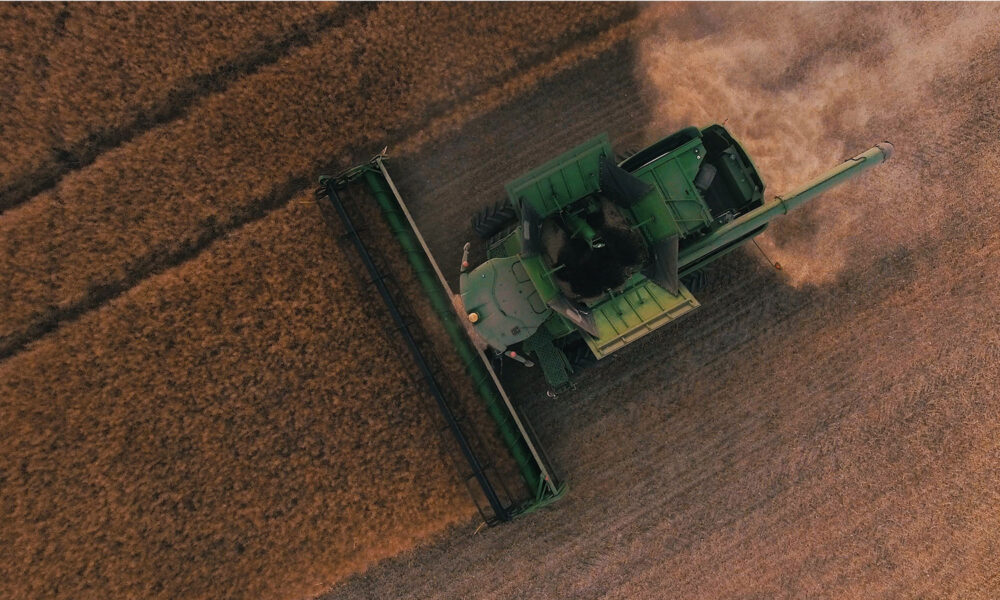The international climate talks that wrapped up in Dubai, United Arab Emirates this week—formally known as the 28th Conference of the Parties, or COP28—had been billed as something of a watershed for their focus on food and farming. But what really happened at COP28 regarding agriculture? And what does it mean back here at home for the five-year food and farm bill that the US Congress is negotiating right now?
Food and farming was on the menu at COP28
The surprising final agreement that emerged from all-night overtime negotiations is extraordinary for its long-overdue focus on transitioning away from fossil fuels. To see that through will require changes in every sector of the global economy, including agriculture, where fossil fuels power farm equipment and the global transport of farm commodities and food. But otherwise, the final COP28 agreement didn’t include any binding commitments on food or farming.
Still, throughout the two-week meeting, those topics took a higher profile than usual. The organizers touted so-called 1.5°C-aligned menus served at COP28—centered around plant-based foods, and referencing the Paris Agreement commitment to limit warming to 1.5 degrees above pre-industrial levels—as evidence of a new commitment to climate-friendly food and farming. Funders pledged $7 billion in new money to help agriculture curb its emissions and cope with the effects of climate change. And December 10 was designated Food, Agriculture and Water Day to showcase commitments in this sector.
The COP28 Food Systems Lead, H.E Mariam bint Mohammed Almheiri of the host country UAE, put a fine point on it:
“To achieve the goals of the Paris Agreement, to keep 1.5C within reach, we must address the connection between global food systems, agriculture, and the climate. At COP28, we have built the foundations for action, which commit 152 countries to transform their food systems, and embedding those commitments in their climate strategies, all the while ensuring they are protecting the livelihoods of those who depend on those sectors. Together, we must build a global food system that is fit for the future. Today marks an important moment in achieving this.”
Almheiri was referring to commitments made in another official document that came out of COP28 on December 1. The UAE Declaration on Sustainable Agriculture, Resilient Food Systems, and Climate Action was also a welcome surprise, stating the intention of countries including the United States to pursue five key objectives: (1) to scale up adaptation and resilience for farmers and food producers, (2) to support nutrition and food security for vulnerable people, (3) to protect and support food and farm workers threatened by the climate crisis, (4) to better manage water in agriculture, and (5) to simultaneously reduce the harmful environmental impacts of agriculture and maximize the sector’s climate benefits.
The declaration isn’t legally binding, and it avoids any mention of the outsize contribution of heat-trapping emissions from the meat industry. Still, it’s an important first step, outlining a number of actions that signatory nations say they intend to take. As such, it should give the US Congress a lot to think about in the food and farm bill that it must write and pass by the extended deadline it gave itself, September 30, 2024.
I’ll get back to this in a minute.
Agribusiness was in Dubai in force
But first, I have to note what stands in the way of all this potential progress, and that is the agribusiness lobby. A lot was written during COP28 (including by a UCS colleague) about the presence of fossil fuel lobbyists in record numbers. But big agribusiness interests—including the chemical fertilizer industry—were also there. The watchdogs at DeSmog published a revealing report mapping the various relationships and avenues for food and agriculture industry influence in Dubai.
Big Food names you know, like McDonald’s, Nestle, and Pepsico, were there hobnobbing with country delegations. So was Tyson Foods, aka Big Chicken. And there were other names you probably haven’t heard of, like the International Fertilizer Association, and Nutrien, a Canadian company that is the world’s largest fertilizer producer overall and the third-largest producer of nitrogen fertilizer specifically. That’s important because, as UCS notes in this new explainer, the production and overuse of petrochemical-based nitrogen fertilizer is a major contributor of heat-trapping emissions, most notably the super climate pollutant nitrous oxide (N2O).
These and other giant agribusiness corporations and industry groups are lobbying against climate action everywhere they can, at global gatherings like COP28 and in the halls of the US Congress.
A first-ever food and farm declaration
To counter this industry lobbying, UCS and partners are pressing Congress to write a new food and farm bill that looks different from the 2018 bill and other previous iterations. Among other things, we have told lawmakers (and President Biden, who will have to sign or veto a food and farm bill next year) that the bill must address the climate crisis head-on for the first time. How to do this is spelled out in the Agriculture Resilience Act (ARA), a bill first introduced in 2020 as a model, or “marker,” for the next food and farm bill. To increase farmers’ resilience to climate impacts, reduce their reliance on fossil gas-based fertilizer, help them store more carbon in their soil, and deliver cleaner water and other environmental benefits, the ARA would ramp up investments in incentives that help farmers change their practices. Congress already adopted some of this, when it included nearly $20 billion in new climate-focused conservation incentives for farmers in the Inflation Reduction Act of 2022. But the ARA also would dramatically expand investments in agriculture research, including science at the intersection of climate change, food production, and nutrition to make sure the food we produce is good for people and the planet. And it includes provisions to reduce food waste as a climate strategy.
As I read it, the UAE Declaration bolsters the case for incorporating the ARA into the next food and farm bill. Having attended my share of United Nations negotiations (more than two decades ago, I coordinated the advocacy organizations that weighed in on the creation of the Stockholm Convention on Persistent Organic Pollutants), I know how carefully every word in a negotiated document is chosen. The UAE Declaration specifically says that signatories “intend to strengthen [their] respective and shared efforts” to do five key things. So again, not legally binding, but stating some very clear intentions, among them to:
Revisit or orient policies and public support related to agriculture and food systems to promote activities which increase incomes, reduce greenhouse gas emissions, and bolster resilience, productivity, livelihoods, nutrition, water efficiency and human, animal and ecosystem health while reducing food loss and waste, and ecosystem loss and degradation.
That sounds a lot like the Agriculture Resilience Act!
The Biden administration—which signed the UAE Declaration on behalf of the United States—should call on Congress to help implement our national intention by incorporating the ARA into the next food and farm bill.
Yes, we do need to transform the food system and US policy
One other line in the UEA Declaration that is worth noting is this, in the preamble:
We affirm that agriculture and food systems must urgently adapt and transform in order to respond to the imperatives of climate change.
The emphasis on “transform” is mine, because transformation is a word that I and my UCS colleagues and partners have been using a lot over the past year to describe what we want to see in a new food and farm bill. The call for transformation in US farm policy, as in global climate agreements, recognizes that our food systems are working for too few of us, and that the climate crisis is challenging farmers, workers, and eaters as never before. The status quo is no longer tolerable. Transformative change in our food systems, and in the policies that shape them, is imperative.
That was the message from 112 organizations, including UCS, in a letter sent to food and farm bill negotiators in Congress earlier this month. That letter calls on the negotiators to “transform our food and agriculture system into one that our farmers, workers, and communities need and deserve,” and lists nearly three dozen marker bills that, collectively, would begin to do that.
The same day we sent that letter, we got a new bit of evidence that the message of transformation had broken through. At a December 6 hearing, House agriculture committee chairman G.T. Thompson (R-PA), said this in his opening statement:
Our task is to build a responsive framework to meet the needs of American agriculture and its vast value chain; we do not need a transformational farm bill to do better; strategic investment and good policy will make all the difference.
Respectfully, Representative Thompson, 152 countries and 112 US food and farm organizations disagree.

